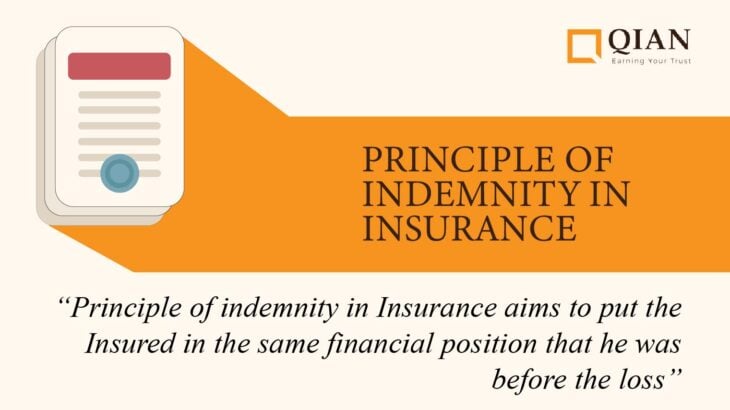Principle of Indemnity in Insurance states that Insurance should place the Policyholder in the same financial position after the loss, as he was in, before the loss. In other words, this means that the Insured cannot use Insurance to earn profits.
Thus, a Contract of Insurance is only meant to reimburse the Policyholder only to the extent of the loss incurred.
Principle of Indemnity is one of the fundamental Principles of Insurance.
What does Indemnity in Insurance mean?
Indemnity or Indemnification in Insurance means that the Insurance Company will compensate the Insured Party only to the extent of losses incurred as per the Policy Terms and Conditions. All Insurance Policies agreement outline how claims will be assessed, what losses are covered, and any exclusions that may apply. An Insurance Policy serves as a legal protection for both parties involved, the Insurance Company and the Insured, ensuring that all eligible losses are compensated according to the Policy terms and conditions.
Principle of Indemnity in Life Insurance
Principle of Indemnity in Insurance works on the principle of compensating the Insured Party for a Financial Loss. A Life Insurance Policy provides a payout to the Beneficiary upon the Insured Person’s death. Thus, a Life Insurance Contract is a value contract and there is no need to assess the extent of financial loss in Life Insurance. Thus, the Principle of Indemnity does not apply to Life Insurance.
Principle of Indemnity in General Insurance
Principle of Indemnity in General Insurance works in different ways depending on the type of Insurance. We illustrate how the Principle of Indemnity works below:
Principle of Indemnity in Fire Insurance
Consider a situation where a Fire Insurance Policy has been issued covering the Plant and Machinery of a Factory Owner. There was a Fire Accident which damaged the Plant and Machinery.
If the Fire Insurance Policy was issued on a Reinstatement Value Basis, the Policy would compensate the Insured Party by paying the Reinstatement Cost of the Machinery otherwise, the Policy would pay the Insured Party the Value of the Machinery by deducting a Depreciation Charge. Thus, Indemnification of Insured depends on the Policy Terms and Conditions in such a case.
Principle of Indemnity in Car Insurance
Usually, in a Car Insurance Policy, the Policy would reimburse the Insured by paying the cost of repairing the vehicle after deducting a Depreciation Charge.
Principle of Indemnity in Agreed Value Policies
In some cases, determining the value of certain assets such as art works, paintings, vintage cars, it is difficult and, in such situations, the Insurance Company and the Insured Party agree on the fair value of the property and an Agreed Value Policy is issued. In case of a claim, the compensation is paid on the basis of the Agreed Value.
Principle of Indemnity in Liability Insurance
In Liability Insurance, the Insurance Policies (Third Party Liability in Motor Insurance or Product Liability Policy) indemnify the Insured Party to the extent of damages awarded by the courts in respect of Bodily Injury or Property Damage to Third Parties.
What factors impact Indemnity in an Insurance Policy?
Following factors impact Indemnity in an Insurance Policy:
- Condition of Average and Deduction for Under Insurance: The Principle of Indemnity also comes into the picture if the Insured insures his property for a Sum Insured lesser than the Actual Value of the Asset. In this case, the Insurance Company is denied of its rightful premium and hence it also applies an Under-Insurance Factor and deducts a proportionate amount towards Under-Insurance in case of a Claim. This is known as Condition of Average.
- Sum Insured: The maximum amount recoverable under an Insurance Policy is the Sum Insured under the Policy or the Actual Loss, whichever is higher.
- Deductible: A General Insurance Policy pays out a Claim after deducting the Deductible or Excess Amount. This is the portion of the loss that the Insured has to bear out of his own pocket. The objective of Deductible is to ensure that Ordinary Losses are not reimbursed and that the Policy only reimburses the Insured for uncertain and accidental losses.
Example of Principle of Indemnity
Consider a situation where Mr XYZ has insured his factory assets with a Fire Insurance Policy for Rs5 Crores. The Factory was damaged in a Fire Accident and the losses were assessed by the Surveyor at Rs2 Crores. The Insurance Company would indemnify Mr XYZ by paying him Rs2 Crores and making good his losses. The Policy would not pay Rs5 Crores to the Insured just because the Insured had purchased an Insurance Policy with a Sum Insured of Rs5 Crores.
The Bottomline
The Objective of Principle of Indemnity in Insurance is that the Insurance Policy should restore the Insured in the same financial position as he was in before the loss to the same financial position after the loss.
Another objective is to ensure that the Insured does not profit out of the Insurance Policy. Principle of Indemnity, thus, serves to eliminate Moral Hazard in Insurance whereby the Insured is not tempted to commit fraud in order to profit out of his Insurance Policy.

